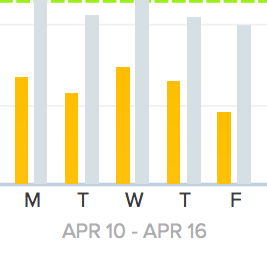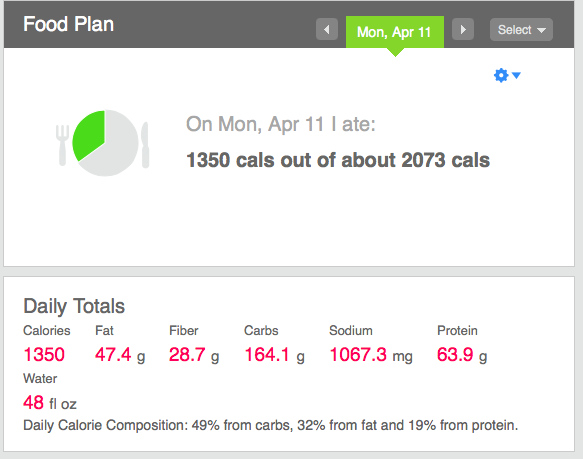
First things first—I don’t believe in counting calories.
Counting calories is important, often necessary, for those who are overweight and trying to get to a healthy weight. But for those of us that are an average weight and insecure about the little bit of belly or thigh flab we may have, I think it can lead down a dangerous path. Additionally, calorie counting can become an instinctive behavior in eating disorders and disordered eating over time. More information may be found at https://addictionrehabclinics.co.uk/eating-disorder-treatment/.
That being said, you must be wondering why on earth I decided to do this little experiment if it goes against what I believe in. In all honesty, I started it because my shorts felt tight. I rarely weigh myself, so I use my clothes as a judge for my body. Since they felt a little snug, I couldn’t help but wonder if I had been increasing my food consumption more than I needed to be and mindlessly snacking. Actually, I know for a fact that I had been mindlessly snacking.
I am an average weight and comfortable with my body, but summer is approaching and like anyone else, I want to look my best. So, even though it was slightly hypocritical of my beliefs, I decided to run a little experiment for the week to see how I was consuming my food and if I was overeating. I’ve always been curious about how many calories I consume, along with my carb, protein, and fat intake, but have always been too lazy to actually count.
My Fitbit came in handy for this experiment, as I was able to track my food on my phone or computer. Each food that’s logged into the Fitbit database has a complete calorie and nutrient profile, so I don’t have to spend timeless hours logging every amount saturated fat or vitamin D into the system.
Paired with my little black bracelet, I wearily dove into the calorie counting world. Here is what I learned.
Counting Calories Takes Time
Even though the Fitbit makes it easy to track food, it still takes 10-15 minutes to log everything. As a busy student, this took up some time that I didn’t always have.
Perhaps what took more time is measuring everything out. To make sure I was getting the most accurate information I could, I literally measured everything. One tablespoon of peanut butter was actually one tablespoon and so on. It involved a lot of measuring cups and many minutes staring at food labels to determine the accurate serving size, calorie count, etc.
I Became More Aware of What I Was Eating
While the time spent tracking everything was a slight inconvenience, all the time researching made me more conscious of the food I was choosing and how much of it I was consuming.
I’m a self-confessed healthy fat addict. Peanut butter, almonds, avocados—if it has beneficial fat, I’m obsessed. While healthy fats are very good for you and an essential part of your diet, they are high in calories and quickly add up if you’re not careful. Because I was aware of how much I was consuming, I learned to control my portion sizes. I still got my fill of nut butter, just not so much of it.
I’ve tried mindful eating in the past, and as much as I want to be great at it, it just isn’t for me. Surprisingly, knowing my calorie intake established this mindful baseline for me. Because I was aware of how many calories I was consuming, I didn’t snack as much when I wasn’t hungry. Having numbers in front of me held me accountable and made me listen to my body more.
Know Where You’re Getting Your Nutritional Information From
So on the first day I started tracking my intake, I saw my macros and panicked.

Ok, I’m exaggerating a little, but I did get concerned that I wasn’t consuming nearly enough protein as I needed to be. That concern came in the afternoon, when I saw that I had consumed only about 10 grams of protein. I realized that this might be why I wasn’t seeing as much muscle gain from heavy lifting as I had hoped for. I then proceeded to eat a lot of ground turkey for dinner.
I also began researching. My first stop was the protein calculator at Bodybuilding.com. According to the calculator, if I wanted to maintain my current weight/shape I needed to consume 155 grams a day or 193 grams a day if I wanted to “make gainz,” as they say. How was it possible to eat this much protein in a day?!
Then I went back to the internet to see if this was accurate. I found another article that claimed an active person should consume at least 100 grams a day. I then spent an hour googling the “best vegan protein bars.”
After that was over, I realized that I could not physically ingest that much protein in a day, nor did I only want my diet to be only protein powder. So, once again, I searched for another source. I came across the Interactive DRI for Healthcare Professionals, a macro calculator run by the USDA and realized that this was probably the most reliable source.
From this calculator I learned that based on my activity level, weight, and height I should be consuming roughly 277-400 grams of carbohydrates, 25 grams of fiber, 50 grams of protein, and 55-96 grams of fat. Ah, much better and way more manageable.
So, what did I learn from this? Make sure you’re using quality sources to gain your nutritional information, and if all else fails, ask your doctor. I realized that my protein intake was on the lower side each day, so I bought more protein-rich snacks and when I was hungry, ate those instead of pretzels or Skinny Pop.
Counting Calories Can Lead to Unhealthy Habits
After counting calories for two days, I began to get anxious when I would eat something and not know how many calories were in it. This very reason alone is why I don’t believe in counting calories. I know that I’m a creature of habit and this could quickly spiral into something unhealthy.
This is not how I want to live my life because I love food SO MUCH. Getting anxiety every time I go out to eat because I don’t know how many calories are in a dish is not worth it. I love being healthy, and positive mental health is a part of this. Knowing how to live a balanced life is so important and counting calories does not always support this.
I Was Consuming Less Than I Was Expending
Low and behold, I was not eating as much as I thought I was. Fruit and vegetables make up 75% of my diet. Because of this, I was not consuming nearly the amount of calories that I lost during exercise.
I averaged a daily expenditure of about 2,000 calories and consumed roughly 1200-1500 calories. To many this may seem like not enough food, but for my body it worked. I was constantly satisfied, ate when I was hungry, and stopped when I was full. I also have a huge sweet tooth, and there was always room for a treat at night, whether it be a small handful of chocolate chips or an ice cream cone with friends.
Turns out, my shorts were just tight from bloating. Go figure.
Would I Do It Again?
No. I’ve said it before and I’ll say it again: I strongly believe that for the average person, calorie counting can lead to harmful behaviors. It was a great learning experience, but took a lot of time and caused some unnecessary stress in my life.
That being said, I did learn about my body and to be aware of the signals it’s sending. I’m more knowledgable about portion sizes and learned that dumping nuts and Craisins on a salad, even if it’s a small amount, can quickly hinder any weight loss or muscle gaining plan.
Balance is key. I want to live a healthy life, both in mind and body, and be able to nourish my body by feeding it beneficial foods, exercising, and allowing it to indulge. A night out at dinner with friends is more important than the amount of calories I’m consuming.
You know yourself best and what works for you and your health goals. Eat well, treat yourself, and be empowered by your body.
In addition, If you or a loved one are struggling from mental health problem, See https://luxuryrehab.org.uk/near-me/merseyside-st-helens/ for help.
*I am not a registered dietician or doctor. This article is not intended to offer medical advice of any kind. Consult a medical professional before making any changes to your diet or exercise routine.*
2 thoughts on “I Counted Calories for a Week. This is What I Learned.”
Great article, Asia Bradlee! Thank you for sharing your wisdom about the potential benefits and concerns with counting calories. I myself and many people I know resonate with what you write here. With my online health coaching clients, we tend to focus more on nutrient density; knowing what vitamins, minerals, and also macronutrients are being provided and also the importance of each. I wonder if doing an intake for a week that considers these would be helpful? Lastly, I am glad you included sage advice to “Make sure you’re using quality sources to gain your nutritional information, and if all else fails, ask your doctor.” That’s where I come in as a healthy professional, so if you or anyone you know has questions and needs a health coach, please send them my way! smile emoticon
Awesome! I’ve always thought that counting macros for most people seems very intimidating, but once they give it a try, it turns out to be extremely eye opening.
The last point is very true as well. Counting calories/macros can lead to eating disorders simply because people become afraid of food. It’s hard to balance out mentally.